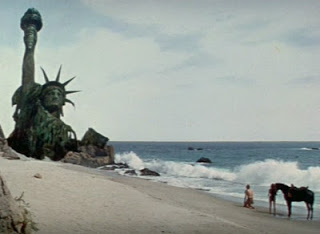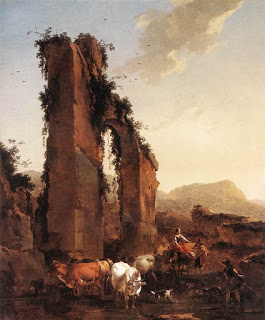One of the standard tropes of both swords-and-sorcery literature and Dungeons & Dragons type game settings is the lost ancient civilization which was possessed of high technology, fell through some cataclysm, and is now known only through legends and a few obscure artifacts.
In fantasy, we see this in many places. The Dying Earth is an obvious example, the World of Greyhawk has its Mighty Servant of Leuk-O and Machine of Lum the Mad, the Judges Guild Wilderlands campaign setting has its share of technological artifacts scattered about the landscape, and Blackmoor has a veritable City of the Gods. We see it in Ralph Bakshi’s wonderfully bizarre film Wizards. The theme is echoed in the legends of Atlantis and Lemuria, and even Middle Earth has its sunken Numenor, which ruled over what could be called a Golden Age, albeit without the benefits of high technology.
There is historical precedent for this as well. After the fall of the western Roman Empire, the successor barbarian kingdoms of the Franks, Anglo-Saxons, Burgundians, Langobards, etc. found themselves rulers over regions that contained architectural wonders that they were flat-out incapable of recreating. Roads of incredible durability, aqueducts demonstrating precision structural engineering, and even baths and villas with central heating that were simply not able to be replicated. Surely these were the works of gods or giants.
I can envision such a fallen technological civilization giving rise to a magical culture, as a sort of cargo cult attempt to replicate the now-unduplicatable wonders of the ancients. Stories are told of wondrous devices that can project an image from one end of the world to the other in an instant, complete with sound. Incapable of making a videophone, the barbarians in the ruins, through trial and error and hard work, manage to figure out the crystal ball instead. Hearing tales of weapons that could spit fire and lightning, but themselves incapable of creating a laser pistol or flamethrower, eventually come upon the secret of fireball and lightning bolt. And so forth. Use of magic develops because technology is no longer within reach.
Arthur C. Clarke once famously observed that “any sufficiently advanced technology is indistinguishable from magic.” That presupposes that the technology comes after the magic. What if a game setting reversed that trend and postulated the corollary?











Heck, throw in some Larry Niven and you can say that magic has been unused so long that it's finally coming back, and that's why they can recreate fabled ancient effects with forces the ancients had no notion of.
-Jeff Russell
I do not agree with your vision of the Franks etc. living in a landscape full of architectural wonders they did not understand.
After all, it is not as if the original people living under Romal rules suddenly went away. Most people just stayed were theyw ere and mingled with the new groups moving in.
Sure, there was a transition of political power, and large migrations taking place in Europe in the 5th and 6th century, but the 'decline of civilization' is a far more continuous process, and the Dark Ages were not that Dark as many stories want us to believe.
It is more the lack of central political power and finances that made it impossible to construct large buildings, rather than the lack of technical understanding.
The Anglo-Saxon poem "The Ruin" is essentially a first person account of this effect in history.
Well-wrought this wall: Wierds broke it.
The stronghold burst…
Snapped rooftrees, towers fallen,
the work of the Giants, the stonesmiths,
mouldereth.
Rime scoureth gatetowers
rime on mortar.
Shattered the showershields, roofs ruined,
age under-ate them.
And the wielders & wrights?
Earthgrip holds them – gone, long gone
fast in gravesgrasp while fifty fathers
and sons have passed.
http://lifeloom.com/MLTruinpoem1.htm
Sorry if this is a double post…
From She, by H. Rider Haggard:
Time after time have nations, ay, and rich and strong nations, learned in the arts, been, and passed away to be forgotten, so that no memory of them remains. This is but one of several; for Time eats up the works of man, unless, indeed, he digs in caves like the people of Kor, and then mayhap the sea swallows them, or the earthquake shakes them in. Who knows what hath been on the earth, or what shall be?